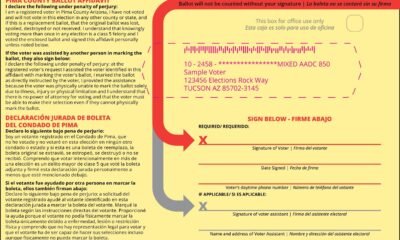alternative COVID treatments
Battling Resilience: Four Years After COVID, He Continues the Fight Against the System

James Holland’s truck serves as a memorial to his late wife, Christina, who passed away due to complications from COVID-19. The back of his tan pickup is adorned with bold vinyl letters conveying a poignant message: “COVID didn’t kill my wife. Lack of care killed her.”
This message is a direct allegation against Chandler Regional Medical Center, where she spent 27 days receiving treatment. The medical facility declined to comment regarding this situation.
Holland, 65, expressed a desire for legal action, saying, “I want them to sue me. That’s the only way I’ll get my day in court.” His grief is compounded by a conviction that the treatments administered to his wife were insufficient. He advocates for alternative treatments like ivermectin and monoclonal antibodies, which remain controversial and discredited by many in the medical community.
During the time of Christina’s passing, ivermectin was heavily scrutinized, with federal agencies warning against its use. Nowadays, its status has shifted; in some states, it is available over the counter, though many healthcare professionals still consider it ineffective against COVID-19.
Holland’s legal inquiries led him to Rachel Rodriguez, a Florida attorney spearheading efforts for criminal investigations into hospital protocols during the pandemic. Initially focused on vaccine-related employment cases, Rodriguez expanded her work to include families like Holland’s, who have lost loved ones and are seeking accountability.
Rodriguez noted a significant barrier posed by the Public Readiness and Emergency Preparedness (PREP) Act, which grants immunity to hospitals for actions taken under federally approved countermeasures. This led to a shift toward criminal petitions targeting hospital administrators rather than individual doctors.
Her legal team has initiated formal petitions in several states, including Arizona, to examine alleged “hospital homicide.” The petitions aim to investigate and potentially prosecute hospital administrators for their roles in the treatment protocols imposed during the pandemic.
Highlighting the urgency of these investigations, Rodriguez’s petitions name multiple Arizona hospitals, including Chandler Regional Medical Center. She represents families asserting that federal incentives drove harmful treatment practices.
The petitions document various allegations of medical malpractice, citing state laws including negligent homicide and vulnerable adult abuse. Rodriguez explained that while the PREP Act offers broad immunity, it does not cover instances of “knowing and willful harm.”
Families impacted during the pandemic are watching these developments closely. Sherri Smith, whose husband died at Banner Desert Medical Center, described her husband’s treatment as a “chemical crucifixion” involving sedatives and paralytics that led to his sufferings.
Rodriguez’s objectives are clear: seeking justice while raising awareness about the documented harms. She criticizes the narrative that hospitals were overwhelmed and emphasizes the need for accountability in cases of potential misconduct.
As discussions around COVID-era policies evolve, Holland hopes his message resonates and encourages others to question their experiences during the pandemic. “If one person sees the truck and starts asking questions, maybe that’s enough,” he said.


















